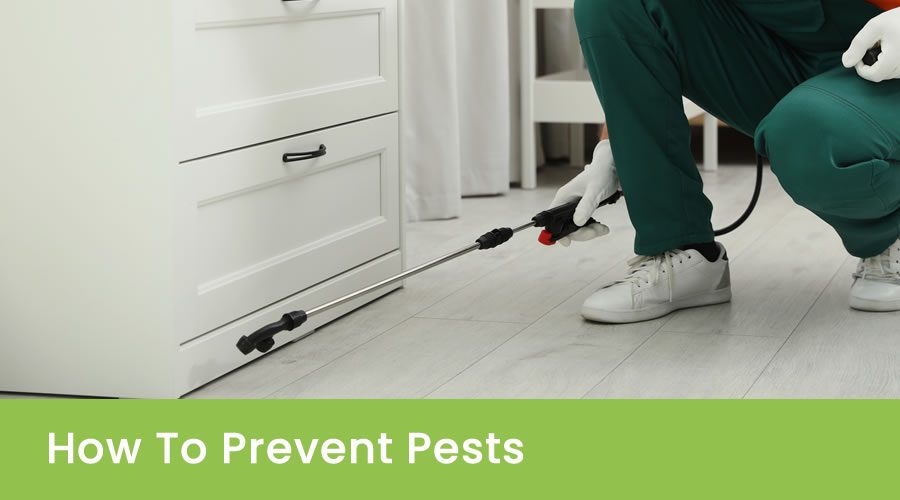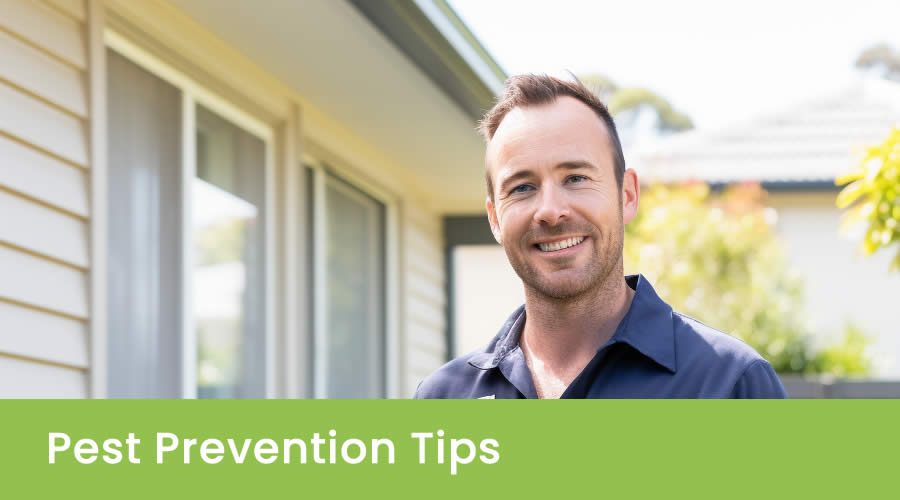How To Prevent Pests
9 Tips To Prevent Pest Infestation
Preventing pests from invading your homes is important for maintaining a clean and healthy environment. For example, unwanted pests such as mice, cockroaches, ants, bed bugs, and more can cause damage to property, spread disease, and be very difficult to eliminate. The best defense is keeping them out in the first place through some key prevention methods.
1. Remove Food Sources
Food left out in the kitchen is one of the main attractions for pests, so keeping all food sealed and properly stored is critical. All human and pet food should be kept in airtight containers and cleaned up right after meals. Trash containing food scraps needs to be taken out regularly to avoid attracting rats and other rodents, and to prevent accumulation of garbage and waste. Dirty dishes, should be kept wiped down. With no source of food available, pests won’t be drawn inside.
2. Eliminate Water Sources
After food, pests need water. Eliminating any pools, leaks, or moisture sources removes this necessity. Fix any leaky pipes, faucets, sinks, or other household water systems. Ensure proper drainage around your home to prevent standing water that attracts mosquitoes and other insects. Remove pet water bowls overnight and change frequently. Empty overflow trays under your refrigerator and house plants. Dehumidify damp rooms like basements. Without accessible water nearby, it’s harder for common household pests to stay indoors.
3. Remove Shelter
Pests also require places to nest, hide, and breed, so sealing off access denies them sites for shelter. Keep rooms free of clutter and debris piles which could harbor pests without detection. Get rid of things that clutter your space. Store items like papers, bags, boxes, etc., neatly off floors inside plastic bins. Check for gaps along walls, at floor and ceiling joints, around pipe entrances, under doors and windows, behind cabinets, and anywhere wires run through. Seal all possible holes and crevices with pest-proof materials. This not only improves safety but also keeps pests out. Eliminate hollow shelving, furniture, etc., by replacing or filling it in. Remove shelter sources so they can’t establish nests and colonies.
4. Seal Entry Points
While sealing up the indoor shelter sites, also check for any outdoor access points pests could use to enter and infiltrate your home. Install weather stripping around doors and door sweeps at the bottom to close door gap space. Ensure windows shut fully and seal any cracks. Add steel mesh screens with holes too small for pests to fit through over vents, grilles, drains, soffits, and pipes leading outside. Inspect the foundation and exterior walls for thin openings, and fill these completely with cement, foam filler, steel wool, or copper mesh. Remove vegetation or wood too close which could provide pathways for termites and other insects.
Taking this step greatly reduces the risk of infestation. Monitoring and sealing every entry spot shuts down all routes inside for pests.
5. Install Screens
We open windows and doors for indoor comfort, but this also allows pests to enter. Therefore, we should add fine mesh screening to enable airflow while keeping insects and rodents out. Quality small gauge stainless steel, bronze, and fiberglass screening installed properly on all doors and windows still permits light and ventilation but serves as a barrier against flies and mosquitoes. Make sure screens fit tightly within frames without any gaps around the edges insects and spiders could crawl through. This is an effective way to prevent pests from entering.
Torn screens should be repaired or replaced right away before access occurs. Keep screens in place year-round, and upgrade to high-performance types for optimal protection.
6. Check for Pests
Be proactive by routinely inspecting both inside and out to check if any pests are present trying to gain access despite preventative measures. Pay special attention to any area where they are likely to hide. Use glue boards, pheromone traps, and visual inspection to monitor for activity. Look carefully along baseboards, under sinks, around pipes, and inside cabinets for droppings, nests, egg cassettes, cocoons, small holes, and other signs of infestation. Check attics, sheds, garages, and basements which could provide undiscovered nesting sites. Outdoors, look at foundations, soffits, windows, doors, vents, and vegetation for indicators.
Catching infestations early allows for quick removal before major spreading happens inside living spaces. Early detection can help prevent a larger problem. Notify your pest control operator if you see pests or have any questions about potential infestations.
7. Check Pets for Fleas
Pets that go outdoors like cats and dogs can pick up fleas, ticks, and mites which will then infest inside your home. These animals can bring pests into your homes. Carefully check your pets regularly. Use veterinarian-recommended topical monthly flea and tick control medications as a preventative to kill and repel these parasites.
Keep infested pets out of your home until treated and cleared, so they don’t spread everywhere indoors and create a major pest problem. Maintaining flea and tick-free pets denies these pests pathways inside.
8. Use Pest Control Products
Use insecticidal dust and other professional-grade pest control products in problem areas and potential entry access spots. These chemical and physical pest-killing agents or pesticides applied correctly and safely will cut down on almost any pest attempting to enter and establish breeding populations inside. Carefully lay down these products according to directions into wall voids, under cabinets, along baseboards, beneath sinks and tubs, behind appliances, etc., where pests tend to originate from.
For rodents like mice and rats, consider using bait stations with baits that are secured and out of reach of children and pets. Always use these products safely and as directed to protect your health and that of your people.
Routinely apply new materials to keep killing active for long-term prevention. Use pesticides to stop pests inside your home.
9. Call A Professional
For serious infestations or pests that keep returning despite your efforts, contact a professional pest control company. With their experience and expertise, they can effectively handle the problem. Qualified pest management specialists have commercial-grade chemicals, treatment methods, and tools to fully clear your home and establish proactive prevention.
They can provide valuable information and services tailored to your specific pest problems. They will seal structure gaps and identify entry spots you can’t access, such as those on the roof or in the gutters. Then, they’ll apply long-lasting perimeter treatments outdoors and install high-quality pest-proof screens.
In Australia, many pest control businesses offer comprehensive solutions. Professionals offer pest prevention plans customised to your situation. Having specialists establish pest barriers provides lasting protection, keeping your home truly free from the inside out. This is the best way to ensure your home remains pest-free.
Take note: Prevention is better than cure.
You can also check these resources for more information about home pest control:
https://www.epa.gov/safepestcontrol/dos-and-donts-pest-control
https://aiccm.org.au/wiki/pests/
https://www.betterhealth.vic.gov.au/health/healthyliving/pest-control-in-the-home




